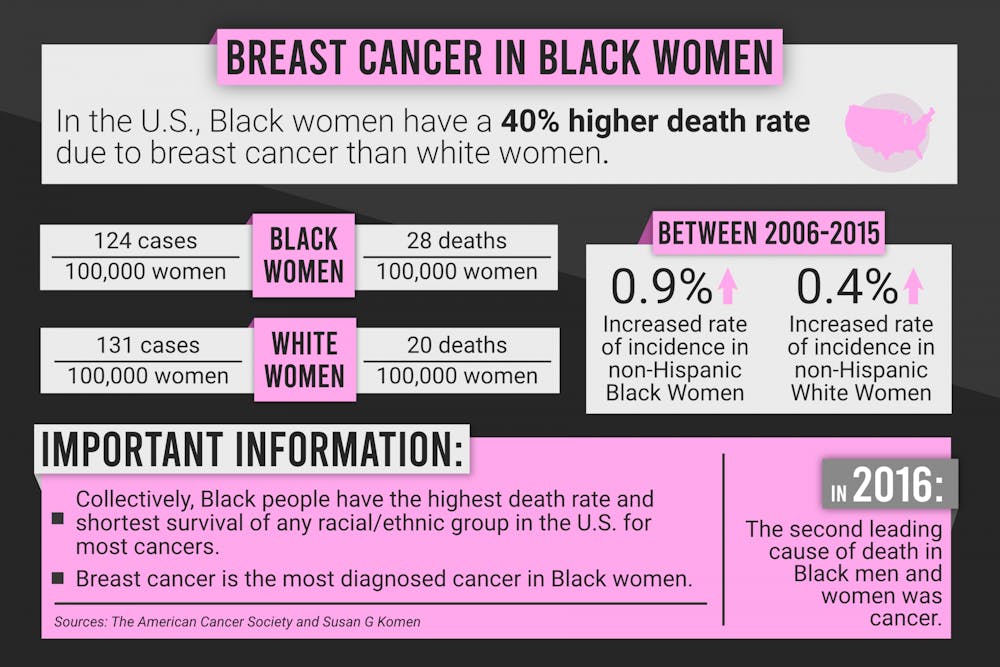A USC program aimed at supporting doctoral students and researching breast cancer disparities is coming to an end in December after its three-year run.
The program, Interdisciplinary Graduate Training to Eliminate Cancer Disparities (IGniTE-CD), is sponsored by Susan G. Komen and is run by co-principal investigators Susan Steck and Angela Murphy. The program has accepted up to three students annually from the Arnold School of Public Health, the USC School of Medicine and the College of Nursing.
The program was also funded by the Susan G. Komen nonprofit organization, which funds a large amount of breast cancer research. The organization provided enough funds for the program to run for three years.
"We lead the training grant and work with doctoral students to try to give them an interdisciplinary, kind of supplementary training in breast cancer disparities research," Steck said.
According to Steck, it's important to research disparities in breast cancer treatment because different ethnicities, especially African American women, are more likely to die of breast cancer.
"We have a large proportion of African Americans who live in Columbia, who live in South Carolina, and many of them have been underrepresented in research," Steck said. "They've been underserved by our healthcare, and so we felt like there was definitely a need in South Carolina for this kind of training grant program."
The students in the program met with the principal investigators biweekly to receive guidance in their doctoral theses, which dealt with various subjects in the area of cancer disparities. Through the program's funding, the students were provided with access to scientific journals, conferences and seminars they would not have been able to access otherwise due to the high price, according one student who went through the program, Prema Bhattacharjee.
The program allows the students to accomplish things such as researching ways to avoid breast cancer disparities through effectively communicating with patients of all literacy levels and cultures, finding relationships between diets and increased cancer risk and receiving numerous awards.
Bhattacharjee, a second-year doctoral student, said she was attracted to the program due to her interest in cancer treatment disparities and her experience as a cancer patient when she was young. Bhattacharjee's main research focus is on disparities caused by a lack of access to proper nutrition.
The program helped students such as Bhattacharjee attend numerous events and gain access to information to help them further their research in their different areas of interest. Bhattacharjee had the opportunity to attend two conferences in California through the program and its funding.
"That really gave me exposure to different students and understanding their research interests and, really, just understanding what more I can do, exploring different avenues in my research area. It was one of the best experiences," Bhattacharjee said.
Another member of the IGniTE-CD, Belinda Polite, is the program's patient advocate and 24-year cancer survivor.
“I gave a more — just from the perspective of a patient, I think, not just as a person of science or just of knowledge and academia, but a person of experience,” Polite said.
Polite was brought in as the patient advocate for the program due to her contributions to breast cancer research through her nonprofit Lights Out for Cancer.
“It’s the research that Dr. Steck and her team do, the amount of hours and research that those students put into it; it was just amazing to be on the front end, front-facing, knowing that they are on the tip of something great,” Polite said.
Bhattacharjee said she become more interested when she found out another cancer survivor was heading the program.
"It kind of sold me," Bhattacharjee said. "I believe that meeting [Polite] was the best experience. Just knowing that there are people who are taking back what they went through. They're taking their experience and putting it in a positive light."
Though the program is ending this year, Steck said she hopes it will receive funding again in the future to continue its work.
"Our goal is really to try to train the next generation of breast cancer disparities researchers. You know, try to empower and inspire these students to continue on in their careers as breast cancer disparities researchers," Steck said.

